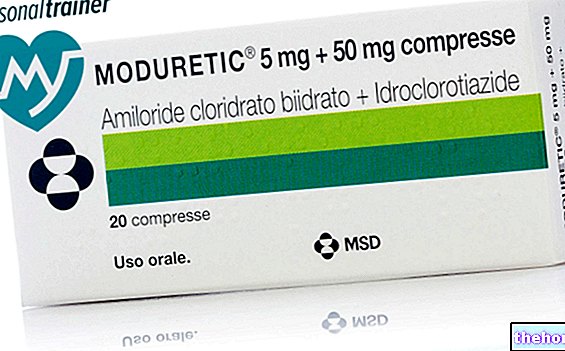Active ingredients: Chlordiazepoxide (Chlordiazepoxide hydrochloride)
Librium 10 mg hard capsules
Indications Why is Librium used? What is it for?
Librium contains the active substance chlordiazepoxide hydrochloride, which belongs to the class of medicines called 'benzodiazepines'. It has calming properties, reduces anxiety, tension and excitement.
Librium is used in adults to treat anxiety, tension, and the physical and mental manifestations associated with anxiety.
Benzodiazepines are indicated only when the disorder is severe, disabling and subjects the subject to severe distress.
Talk to your doctor if you don't feel better or if you feel worse.
Contraindications When Librium should not be used
Do not take Librium
- if you are allergic to chlordiazepoxide hydrochloride or any of the other ingredients of this medicine (listed in section 6)
- if you suffer from mental disorders without feeling anxious
- if you suffer from myasthenia gravis (a serious disease affecting the muscles which manifests itself as weakness and tiredness
- if you have severe lung failure (severe reduction in lung function)
- if you are in a coma
- if you suffer from severe respiratory failure (severe reduction in the activity of the respiratory system)
- if you have severe liver failure (severe liver disease)
- if you have sleep apnea syndrome (temporary cessation of breathing during sleep)
- if you have suffered from alcohol, medication or drug addiction
- if you suffer from spinal or cerebral ataxia (movement disorder with loss of coordination of muscles and joints)
- if you have ever been intoxicated with substances or medicines that reduce the activity of the nervous system (alcohol, medicines used to relieve pain, medicines used to treat certain disorders of the nervous system).
Do not give Librium to children and adolescents (0-18 years of age).
Precautions for use What you need to know before taking Librium
Talk to your doctor or pharmacist before taking Librium.
In particular, talk to your doctor or pharmacist before taking Librium if you think any of the following apply to you:
- suffer from chronic respiratory failure
- suffer from mental disorders (psychotic illness, phobia, obsessive-compulsive disorders)
- suffer from personality disorders
- suffer from depression, because Librium can make your situation worse and increase your tendency to suicide (try to kill yourself)
- you suffer from a decrease in albumin, a substance contained in the blood
- suffer from liver failure (liver disease)
- suffer from kidney failure (kidney disease)
If you have to take Librium for a long time, your doctor will periodically check your blood pressure and order blood tests to check for changes in your blood cells and the state of functioning of your liver and kidneys.
Interactions Which drugs or foods can modify the effect of Librium
Tell your doctor or pharmacist if you are taking, have recently taken or might take any other medicines.
Tell your doctor or pharmacist if you are taking any of the following medicines as they can increase the side effects of Librium: medicines that reduce the activity of the central nervous system because Librium can increase their effect.
- antipsychotics (medicines used for some mental illnesses)
- tranquilizers, as they can increase the relaxing effects and increase the risk of falls, particularly if you are elderly
- anxiolytics / sedatives (medicines that cause physical and mental numbness)
- hypnotics (calming and sleep-stimulating medicines)
- antidepressants (medicines used to treat depression)
- narcotic analgesics (medicines for the treatment of acute or chronic high intensity pain). Furthermore, these medicines taken together with Librium can increase euphoria and physical and mental dependence
- antiepileptics (medicines used to treat epilepsy), particularly with hydantoins and barbiturates. In this case the doctor may change the dose of Librium in the initial stages of treatment
- anesthetics
- antihistamines (medicines used to counteract allergic manifestations) with sedative activity
Tell your doctor or pharmacist if you are taking medicines that affect the way the liver works such as:
- cimetidine (a medicine used in stomach ulcers)
- omeprazole
- macrolide antibiotics (such as erythromycin)
- disulfiram
- contraceptives (medicines used to prevent conception) as they can increase the effects of Librium.
- Rifampicin, because it decreases the effects of Librium.
Sodium oxybate (medicine used to treat narcolepsy, a disease of the nervous system), because it increases respiratory depression.
Also tell your doctor if you need to take any of the following medicines for a long time:
- antihypertensive medicines (medicines used to lower blood pressure)
- beta blockers, cardiac glycosides (medicines that slow the heart rate or rate and heart problems)
- anticoagulants (medicines used to thin the blood).
Warnings It is important to know that:
Tolerance development
After repeated use of this medicine for a few weeks, there may be a decrease in its effectiveness (tolerance).
Addiction development
The use of high doses and / or for prolonged periods of chlordiazepoxide can cause physical and psychological dependence, as occurs with other medicines similar to chlordiazepoxide.
This risk is higher if you have abused drugs or alcohol in the past, as you are more likely to develop a habit and addiction to this medicine.
When physical dependence has developed, abruptly stopping chlordiazepoxide may cause withdrawal and / or rebound symptoms (see section 3 "How to take Librium" for more details).
Memory disturbances (amnesia)
The use of chlordiazepoxide can cause memory disturbances. This occurs most often several hours after taking the medicine. Therefore, to reduce the risk, before taking this medicine you must ensure that you can have sufficient uninterrupted sleep. 7-8 hours (see section "How to take Librium").
Behavioral reactions (Psychiatric reactions and paradox)
When using chlordiazepoxide or any benzodiazepine, unexpected anxious or aggressive behavioral reactions may occur (see section 4. Possible side effects). In this case, stop taking the medicine immediately and contact your doctor. These reactions are more common in children and the elderly.
If you are elderly
If you are elderly, take Librium as prescribed by your doctor.
This medicine may increase the risk of falls and fractures due to a relaxing effect on the muscles
Librium with alcohol
Do not drink alcohol while taking Librium because taking alcohol and Librium at the same time may increase the sedative effect (relaxation of your body and mind) of this medicine. If you have abused alcohol in the past, your doctor will monitor you. during treatment with Librium, as you are more likely to become addicted to this medicine. Drinking alcohol with Librium can also lead to severe impairment of the ability to drive and use machines (see section "Driving and using machinery ").
Children and adolescents
Do not give Librium to children and adolescents (0-18 years of age).
Pregnancy, breastfeeding and fertility
If you are pregnant or breast-feeding, think you may be pregnant or are planning to have a baby, ask your doctor or pharmacist for advice before taking this medicine.
Pregnancy: Avoid taking Librium during pregnancy, especially during the first 3 months and the last 3 months of pregnancy.
However, your doctor may prescribe this medicine only in case of real need.
If, for serious health reasons, your doctor decides to prescribe this medicine during the last 3 months of pregnancy or during labor at high doses, the newborn may experience side effects such as irregular heart rate, difficulty in sucking milk. , lowering of temperature, reduction of muscle tone and reduction of breathing.
If Librium has been taken for an extended period and continued during the later stages of pregnancy, your baby may experience physical dependence and withdrawal symptoms (see section 2. What you need to know before taking Librium).
The risk of malformations with the administration of therapeutic doses of chlordiazepoxide in early pregnancy is low. However, some studies report an increased risk of malformations of the palate. In case of overdose and chlordiazepoxide poisoning, children exposed in the prenatal period are malformations and mental retardation were observed.
Breastfeeding: Avoid taking Librium if you are breastfeeding, as this medicine passes into breast milk.
Fertility: if you intend to become pregnant or if you suspect that you are pregnant, you should contact your doctor who will consider stopping treatment with this medicine.
Driving and using machines
Do not drive or use machines if you experience side effects such as sedation (physical and mental relaxation), amnesia (memory disturbances), difficulty concentrating and impaired muscle function during treatment with Librium. Your alertness may be impaired especially if you have not slept long enough (7-8 hours) after taking Librium.
Librium contains lactose (milk sugar)
If you have been told by your doctor that you have an intolerance to some sugars, contact your doctor before taking this medicinal product.
Dosage and method of use How to use Librium: Dosage
Always take this medicine exactly as your doctor or pharmacist has told you. If in doubt, consult your doctor or pharmacist.
Your doctor will work out the dose and frequency that is most suitable for you so that you can avoid taking too much of this medicine.
How many
The recommended dose is 1 capsule (10 mg) 2-3 times a day, up to 3 capsules (30 mg) a day. In severe cases, your doctor may prescribe 2 capsules (20 mg) 2-4 times a day. Your doctor may prescribe a higher dose depending on the severity of the disease.
Do not exceed the maximum dose of 8 capsules per day (80 mg).
In the opinion of the physician this dose can be increased up to 300 mg per day.
Like
Swallow the tablet with some liquid without chewing.
After taking this medicine, you should allow about 7-8 hours to rest or sleep.
If you are elderly and / or debilitated or suffer from brain damage or kidney or liver or breathing problems
The recommended dose is 1 capsule 1 to 2 times a day.
Duration of treatment
Your doctor will prescribe the shortest possible treatment duration.
Generally the duration of treatment should not exceed 4 weeks, including a gradual withdrawal period.
At the start of treatment with Librium, your doctor will instruct you on how to gradually decrease the dose of this medicine in order to reduce your risk of experiencing withdrawal and rebound symptoms (see sections "If you stop taking Librium" and "Possible side effects" ").
In certain cases, the doctor may decide to extend the treatment duration indicated above, after re-evaluating your state of health.
If you forget to take Librium
Do not take a double dose to make up for a forgotten capsule.
If you stop using Librium
- Do not stop taking Librium without first checking with your doctor.
- Your doctor will gradually reduce your dose during the withdrawal phase of therapy.
- Abrupt discontinuation of this medicine may result in:
- withdrawal symptoms such as depression, headache, muscle aches, muscle weakness, nervousness, extreme anxiety, tension, restlessness, confusion and irritability, mood changes, sweating, diarrhea, irritability.
In severe cases it could manifest a feeling of detachment or estrangement from oneself or the outside world, increased sensitivity to sounds, numbness and tingling of the legs or arms, hypersensitivity to light, noise and physical contact, perception of things that do not exist in reality, epileptic fits
- rebound symptoms (when symptoms that led to treatment with this medicine come back in a more severe form after stopping treatment) such as mood changes, anxiety, restlessness or sleep disturbances.
If you have any further questions on the use of Librium, ask your doctor or pharmacist.
Overdose What to do if you have taken too much Librium
In case of accidental ingestion / intake of an excessive dose of Librium, notify your doctor immediately or go to the nearest hospital.
Symptoms
If you accidentally take more medicine than prescribed it can be life threatening, particularly if you also take alcohol or other medicines at the same time.
In mild cases of accidental ingestion / intake of an overdose of Librium the symptoms that may occur are:
- drowsiness
- mental confusion
- continuous sleep and reduced response to normal stimuli (lethargy).
In severe cases, the symptoms can be:
- reduced motor and gait coordination (ataxia)
- decreased muscle tone (hypotonia)
- low blood pressure (hypotension)
- reduced breathing (respiratory depression)
- coma
- death.
Treatment
The doctor, after the evaluation of the symptoms, will carry out the appropriate support therapy (performing gastric lavage, administration of activated charcoal). Induction of vomiting is not recommended. Due to the high protein binding and high volume of distribution of chlordiazepoxide, forced diuresis or haemodiuresis appear to be of little value.
Your doctor may consider using flumazenil (a medicine that works by blocking the effect of benzodiazepines).
If you are taking medicines to treat depression or have epilepsy, please tell your doctor, as flumazenil should be used with extreme caution in these cases.
In case of arousal, barbiturates should not be used.
Side Effects What are the side effects of Librium
Like all medicines, this medicine can cause side effects, although not everybody gets them.
Contact your doctor immediately if you experience the following serious side effects while taking Librium; your doctor will explain how to stop using the medicine:
- restlessness, agitation, irritability
- aggression
- disappointment
- anger
- nightmares, hallucinations
- psychosis
- inappropriate behavior, behavioral changes, manifestation of depression that had not yet manifested itself
- memory disturbances (amnesia). This effect occurs most often several hours after taking the medicine and therefore, to reduce the risk, before taking this medicine you must make sure that you have sufficient uninterrupted sleep of 7-8 hours (see section "How to take Librium ")
- physical and mental dependence (see the sections "If you stop taking Librium" and "Warnings and precautions")
- reduced level of consciousness
- emotional disturbances
- depression
- unexpected reactions (paradoxical reactions) for example:
- anxiety
- sleep disturbances, insomnia.
- tendency to kill oneself.
These reactions are more common if you are elderly.
The following side effects have been observed and reported during treatment with Librium with the following frequencies:
Common (may affect up to 1 in 10 people):
- sedation
- dizziness
- drowsiness
- movement disorder with loss of coordination of muscles and joints (ataxia)
- balance disorders
- confusional state
- tiredness
Rare (may affect up to 1 in 1000 people):
- decreased function of the bone marrow that produces blood cells (e.g. thrombocytopenia, leukopenia, agranulocytosis, pancytopenia)
- headache
- dizziness
- vision difficulties including double vision
- low blood pressure
- stomach and intestinal disorders
- skin reactions (e.g. skin rash)
- inability of the urinary bladder to empty completely (urinary retention)
- sexual desire disorders (libido disorders), erectile dysfunction
- menstrual problems
Not known (frequency cannot be estimated from the available data)
- allergy
- increased appetite
- difficulty articulating words (dysarthria)
- gait disturbances
- extrapyramidal disorders (e.g. tremor, difficulty moving)
- breathing depression
- yellowish discoloration of the skin and whites of the eyes
- increase in bilirubin in the blood, which causes the skin and eyes to become yellowish
- increase in transaminases, substances found in the liver whose increase may indicate the presence of liver damage
- increase in alkaline phosphatase, a substance present in the blood, the increase of which may indicate the presence of bone damage
- muscle weakness
You may also experience the following side effects for which the frequency is not known.
Muscle and bone disorders: instability
Disorders of the stomach and intestines: variations in salivation
Disorders of the kidneys and urinary tract: incontinence
Reporting of side effects
If you get any side effects, talk to your doctor or pharmacist. This includes any possible side effects not listed in this leaflet. You can also report side effects directly via the national reporting system at www.agenziafarmaco.it/it/responsabili.
By reporting side effects you can help provide more information on the safety of this medicine.
Expiry and Retention
Keep this medicine out of the sight and reach of children.
This medicine does not require any special storage conditions.
Do not use this medicine after the expiry date which is stated on the carton after EXP. The expiry date refers to the last day of that month.
Do not throw any medicines via wastewater or household waste. Ask your pharmacist how to dispose of medicines you no longer use. This will help protect the environment.
Other Information
What does Librium contain
- the active ingredient is chlordiazepoxide hydrochloride. Each capsule contains 10 mg of chlordiazepoxide hydrochloride.
- the high components are lactose (see section Librium contains lactose), talc, starch, gelatin, titanium dioxide, iron oxide (E172).
Description of the appearance of Librium and contents of the packages
It comes in hard capsules for oral use, packed in blisters of 30 capsules.
Source Package Leaflet: AIFA (Italian Medicines Agency). Content published in January 2016. The information present may not be up-to-date.
To have access to the most up-to-date version, it is advisable to access the AIFA (Italian Medicines Agency) website. Disclaimer and useful information.
01.0 NAME OF THE MEDICINAL PRODUCT
LIBRIUM 10 MG HARD CAPSULES
02.0 QUALITATIVE AND QUANTITATIVE COMPOSITION
One capsule contains:
Active principle
Chlordiazepoxide hydrochloride 10 mg
Excipients with known effects: lactose
For the full list of excipients, see section 6.1.
03.0 PHARMACEUTICAL FORM
Hard capsules for oral use.
04.0 CLINICAL INFORMATION
04.1 Therapeutic indications
Anxiety, tension and other somatic or psychiatric manifestations associated with anxiety syndrome.
Benzodiazepines are indicated only when the disorder is severe, disabling and subjects the subject to severe distress.
04.2 Posology and method of administration
Dosage
As Librium has a wide range of clinical indications, its optimal dose varies according to the diagnosis and patient reactivity. Only an individual dosage will allow to obtain the best therapeutic results.
Adults: in mild and medium severity states, 10 mg of Librium 2-3 times a day, up to 30 mg a day. In the most severe forms 20 mg of Librium 2-4 times a day.
The maximum dose is 80 mg. Generally, the overall duration of treatment should not exceed 4 weeks, including a gradual withdrawal period.
In acute arousal states (delirium tremens, hysterical states, panic states, psychotic excitement, etc.), daily doses of Librium around 50-100 mg can be administered; depending on the need this dose can be increased up to 300 mg per day. Once the therapeutic effect has been achieved, the daily dose should be reduced until the maintenance dose is established.
It is advisable to start treatment with the minimum dose indicated, subsequently increasing it, if necessary, after having tested the individual reactivity. The lowest dose that allows adequate control of symptoms should be used; the maximum dose should not be exceeded. and the duration of treatment should be determined on an individual basis in relation to the patient's response and the severity of the disorder.
Treatment in anxiety states should be as short as possible. The patient's clinical condition should be re-evaluated on a regular basis to determine whether treatment should be continued, particularly in the absence of symptoms.
The duration of treatment should be as short as possible and should not exceed 4 weeks. In certain cases, extension beyond the maximum treatment period may be necessary; in this case, such extension of treatment should not take place without reassessment of the patient's condition. Little is known about the efficacy or safety of benzodiazepines in use. long-term. Chronic long-term use is not recommended.
Treatment should always be tapered off gradually. Patients who have taken benzodiazepines for a prolonged time may require a longer period during which doses must be reduced. The help of a specialist may be appropriate.
Since chlordiazepoxide is a long-acting benzodiazepine, the patient should be monitored regularly to decrease, if necessary, the dose or frequency of administration in order to prevent overdose due to accumulation.
Special populations
In the treatment of elderly or debilitated patients, patients with organic brain damage, respiratory insufficiency and / or renal or hepatic dysfunction, half the above doses should not be exceeded.
Pediatric population
Librium is not for use in children and adolescents under 18 years of age. The safety and efficacy in children and adolescents has not yet been established.
Method of administration
Oral use. To be swallowed with water without chewing.
04.3 Contraindications
Hypersensitivity to the active substance, to benzodiazepines, or to any of the excipients listed in section 6.1.
Librium is contraindicated in case of:
Psychotic reactions without a prominent anxious component.
Myasthenia gravis.
Severe pulmonary insufficiency.
Comatose states.
Severe respiratory insufficiency.
Severe hepatic insufficiency.
Sleep apnea syndrome.
History of addiction (alcohol, medications, or drugs)
Spinal or cerebral ataxia
Acute intoxication with CNS depressants (alcohol, analgesics, hypnotics, neuroleptics, antidepressants, and lithium)
Children and adolescents under 18 years of age.
04.4 Special warnings and appropriate precautions for use
Tolerance
Some loss of efficacy to the hypnotic effects of benzodiazepines may develop after repeated use for a few weeks.
The dosage of chlordiazepoxide must be individual and correspond to the minimum effective one to avoid accentuated sedative effects. The sensitivity of the CNS to benzodiazepines generally differs from patient to patient according to age, sex, psychic and mental state and interference with other drugs.
When the product is taken for long periods of time, periodically monitor the progress of blood pressure, blood crasis and the state of hepatic and renal function.
Dependence
The use of benzodiazepines can lead to the development of physical and psychological dependence on these drugs. The risk of dependence increases with dose and duration of treatment; but dependence can also occur during short-term treatment within the therapeutic dosage range. Especially in patients with alcohol and drug addiction, or in patients with a history of severe personality disorder, this risk is increased, therefore Librium is contraindicated in patients with a history of addiction (see section 4.3).
Once the physical dependence has developed, the abrupt termination of treatment will be accompanied by withdrawal symptoms. These may consist of depression, headache, muscle aches, muscle weakness, nervousness, extreme anxiety, tension, restlessness, confusion and irritability, mood changes, rebound insomnia, sweating, diarrhea, or irritability.
In severe cases, the following additional symptoms may occur: derealization, depersonalization, hyperacusis, numbness and tingling of the extremities, hypersensitivity to light, noise and physical contact, hallucinations or seizures.
Abuse of benzodiazepines has been reported
Rebound insomnia and anxiety
A transient syndrome in which symptoms leading to treatment with benzodiazepines recur in an aggravated form may occur upon discontinuation of treatment. It may be accompanied by other reactions, including mood changes, anxiety, restlessness or sleep disturbances.
Since the risk of withdrawal or rebound symptoms is greater after abrupt discontinuation of treatment, a gradual decrease in dosage is suggested.
Duration of treatment
The duration of treatment should be as short as possible (see section 4.2) and should not exceed 4 weeks. Repeated habitual prescriptions should be avoided.
Extending therapy beyond this period should not occur without reassessment of the clinical situation. It may be helpful to inform the patient when treatment begins that it will be of limited duration and to explain precisely how the dosage should be progressively decreased. It is also important that the patient is informed of the possibility of rebound phenomena, thus minimizing the anxiety about these symptoms should they occur when the drug is discontinued.
When using benzodiazepines with a long duration of action, such as chlordiazepoxide, it is important to warn the patient that abrupt change to a short-acting benzodiazepine is not recommended, as withdrawal symptoms may occur.
Amnesia
Amnesia may occur. Benzodiazepines can induce anterograde amnesia. This occurs most often several hours after ingestion of the drug and, therefore, to reduce the risk it should be ensured that patients can have 7-8 hours of uninterrupted sleep (see section 4.8).
Psychiatric reactions and paradox
Psychiatric and paradoxical reactions such as restlessness, agitation, irritability, aggression, delusion, anger, nightmares, hallucinations, psychosis, inappropriate behavior, other behavioral changes, unmasking of a suicidal depression and other disorders are known to occur when using benzodiazepines. negative behavior. Should this occur during treatment with Librium, its administration should be discontinued. Such reactions are more frequent in children and the elderly.
Specific groups of patients
Elderly and debilitated patients need to take a reduced dose (see section 4.2). Likewise, a lower dose is suggested for patients with chronic respiratory failure due to the risk of respiratory depression.
Benzodiazepines are not indicated in patients with severe hepatic insufficiency as they can precipitate encephalopathy. In patients with hepatic or renal insufficiency and in patients with hypoalbuminemia, the dosage must be suitably reduced to avoid the appearance of accentuated secondary reactions.
Benzodiazepines are not recommended for the primary treatment of psychotic illness, phobia or obsessive-compulsive disorder.
Benzodiazepines should not be used alone to treat depression or anxiety associated with depression as they may reveal suicidal depression (suicide can be precipitated in such patients). Extreme caution should be used when prescribing benzodiazepines to patients with personality disorders Benzodiazepines should be used with extreme caution in patients with a history of drug and alcohol abuse.
In the event of loss or bereavement, psychological adaptation may be inhibited by benzodiazepines. Due to the "muscle relaxant effect in the elderly there is a risk of falls and consequent fractures."
Librium is not recommended during pregnancy. The drug should be administered only in case of real need under the direct supervision of the physician and for short periods of time (see section 4.6).
Since benzodiazepines are excreted in breast milk, the use of Librium is not recommended during lactation (see section 4.6).
Important information about some of the excipients
Librium contains lactose. Patients with rare hereditary problems of galactose intolerance, the Lapp-lactase deficiency or glucose-galactose malabsorption should not take this medicine.
04.5 Interactions with other medicinal products and other forms of interaction
Chlordiazepoxide, like other benzodiazepines, can be used in the combined therapy of depressive states or psychotic reactions when an anxious component is evident. In any case, the association with other psychotropic drugs requires particular caution and vigilance on the part of the physician to avoid unexpected undesirable effects from interaction.
When combined with CNS depressant drugs, such as antipsychotics (neuroleptics), tranquilizers, hypnotics, anxiolytics / sedatives, antidepressants, narcotic analgesics, antiepileptics, anesthetics and sedative antihistamines, Librium can reinforce their action.
In the case of narcotic analgesics, increased euphoria may occur leading to increased psychic dependence. The elderly require special supervision. Librium in combination with 4-hydroxybutanoic acid (sodium oxybate) can cause increased respiratory depression
Concomitant alcohol intake should be avoided. The sedative effect may be enhanced when the drug is taken in conjunction with alcohol. This adversely affects the ability to drive or use machines
Concomitant treatment with tranquilizers may increase the muscle relaxant effects, in particular elderly patients treated with high doses of Librium should be carefully monitored (increased risk of falls).
When Librium is used in combination with anti-epileptic drugs the side effects and toxicity may be exacerbated, in particular with hydantoins or barbiturates or combinations that include them. Therefore, particular attention should be paid to dose adjustment in the initial stages of treatment.
Known inhibitors of liver enzymes, eg cimetidine, omeprazole, macrolide antibiotics (erythromycin) and disulfiram have been shown to reduce the clearance of benzodiazepines and may enhance their action. The same is true for the use of contraceptive agents. Known inducers of liver enzymes, eg rifampicin, may increase the clearance of benzodiazepines.
In patients undergoing long-term treatment with other drugs (such as centrally acting antihypertensive agents, beta-blockers, anticoagulant agents and cardiac glycosides), the nature and extent of the interactions cannot be safely predicted.
04.6 Pregnancy and breastfeeding
Pregnancy
Chlordiazepoxide crosses the placental barrier. Based on human experience chlordiazepoxide can cause congenital malformations as described below when administered during pregnancy. Animal studies have shown reproductive toxicity (see section 5.3).
Librium is not recommended during pregnancy, especially during the first and last trimester of pregnancy unless the clinical condition of the woman requires treatment with chlordiazepoxide (see section 4.4).
If, for serious medical reasons, the product is administered in high or low doses over a prolonged period during the last trimester of pregnancy or during labor, effects on the newborn may occur, such as irregular heart rate, difficulty in sucking ( flaccid child syndrome), hypothermia, hypotonia and respiratory depression due to the pharmacological action of the drug.
Additionally, infants born to mothers who have chronically taken benzodiazepines during late pregnancy may develop physical dependence and may be at some risk of developing withdrawal symptoms in the postnatal period.
Observations in humans have so far shown no clear evidence of a teratogenic effect of chlordiazepoxide, while increased resorption rates, increased incidence of stillbirth and neonatal death, skull malformations (exencephaly) have been observed in animal studies. , cleft palate), pulmonary abnormalities and changes in the urogenital tract as well as behavioral and neurochemical changes have been observed in the offspring.
The risk of malformations with the administration of therapeutic doses of chlordiazepoxide in early pregnancy appears to be low, although some epidemiological studies have shown an increased risk for the onset of cleft palate and there are some cases of malformations and mental retardation in children. exposed in the prenatal period after overdose and chlordiazepoxide poisoning.
Feeding time
Since benzodiazepines are excreted in breast milk, administration to breastfeeding mothers is not recommended (see section 4.4).
Fertility
If Librium is prescribed to a woman of childbearing age, she should be advised that, whether she intends to become pregnant or suspects she is pregnant, she should contact her doctor to consider stopping treatment.
04.7 Effects on ability to drive and use machines
Patients should be warned that benzodiazepines can affect skilled work performance.
Based on the modalities of use, dose and individual sensitivity, sedation, amnesia, alteration of muscle concentration and function, which can be induced by the intake of chlordiazepoxide, as well as by that of other drugs of the same type. of action, may adversely affect the ability to drive or use machines.
If sleep duration has been insufficient, the likelihood of impaired alertness may be increased (see section 4.5).
Patients should also be advised that alcohol can intensify these changes, and therefore alcohol should be avoided during treatment.
04.8 Undesirable effects
The evaluation of undesirable effects is based on the following frequencies:
• Very common (≥ 1/10)
• Common (≥ 1/100 a
• Uncommon (≥ 1 / 1,000 a
• Rare (≥ 1 / 10,000 a
• Very rare (
• Not known (frequency cannot be estimated from the available data).
1) Anterograde amnesia can occur at therapeutic doses, with increased risk at higher doses.
This may be associated with improper behavior (see section 4.4).
2) pre-existing depression can be unmasked by benzodiazepines.
When using benzodiazepine-like substances it is known that reactions such as restlessness, agitation, irritability, aggression, disappointment, anger, nightmares, hallucinations, psychosis, inappropriate behavior and other adverse behavioral effects can occur. These effects may be quite marked with the use of this product. They are more likely in children and the elderly.
The use (even of therapeutic doses) can lead to the development of physical dependence: discontinuation of therapy can lead to withdrawal symptoms or rebound phenomena. Psychological dependence can occur.
Abuse of benzodiazepines has been reported.
The following may occur: instability, variations in salivation and incontinence
Reporting of suspected adverse reactions
Reporting of suspected adverse reactions occurring after authorization of the medicinal product is important as it allows continuous monitoring of the benefit / risk balance of the medicinal product. Healthcare professionals are asked to report any suspected adverse reactions via the national reporting system. "address www.agenziafarmaco.gov.it/it/responsabili.
04.9 Overdose
As with other benzodiazepines, an overdose of chlordiazepoxide is generally not life-threatening. When taken with centrally acting drugs, particularly alcohol, the effects of overdose are likely to be more severe and, in the absence of supportive measures, can prove fatal.
Signs and symptoms
Benzodiazepine overdose usually results in varying degrees of central nervous system depression, ranging from somnolence to coma. In mild cases, symptoms include drowsiness, mental confusion and lethargy; in severe cases, symptoms may include ataxia, hypotonia, hypotension, respiratory depression, rarely coma, and very rarely death.
Treatment
In mild cases, patients need to sleep while respiratory and circulatory function is monitored. Induction of vomiting is not recommended. The use of activated charcoal may reduce absorption. Gastric lavage is not routinely recommended, but can be done in severe cases. In severe cases, additional measures may be necessary (stabilization of the circulatory function, intensive monitoring) Due to the high protein binding and high volume of distribution of chlordiazepoxide, forced diuresis or haemodiuresis appear to be of little value. Flumazenil is indicated to antagonize the central depressive effect in poisoning with severe respiratory and cardiovascular insufficiency. Control of respiratory and cardiovascular functions must be maintained. The benzodiazepine antagonist flumazenil is not indicated in patients with epilepsy who have been treated with benzodiazepines. The antagonism of the effect of benzodiazepines in these patients can cause convulsions.
In case of arousal, barbiturates should not be used.
05.0 PHARMACOLOGICAL PROPERTIES
05.1 Pharmacodynamic properties
Pharmacotherapeutic group: Anxiolytics, benzodiazepine derivatives
ATC code: N05BA02
Chlordiazepoxide is a 1,4-benzodiazepine psychotropic substance with properties of tension relief, arousal, anxiety and sedative and hypnotic effects. Chlordiazepoxide has muscle relaxing and anticonvulsant effects.
Chlordiazepoxide binds to specific benzodiazepine receptors located on GABA-ergic neurons and potentiates the inhibitory actions of GABA-ergic neurons in the nervous system. Development of tolerance was observed after prolonged treatment with benzodiazepines. Chronic use of benzodiazepines leads to compensatory changes in the central nervous system. GABA A receptors may become less sensitive to the continued acute effects of benzodiazepines, either as a result of adaptation in the same GABA A receptor or by intracellular mechanisms, or by changes in the systems. neurotransmitters Probably multiple adaptive mechanisms coexist simultaneously.
05.2 Pharmacokinetic properties
Absorption
Librium is well absorbed, with peak blood levels occurring one to two hours after administration. The drug has a half-life of 6-30 hours. Steady-state levels are generally reached within three days.
Metabolism
Chlordiazepoxide is metabolised to desmethylchlordiazepoxide. Demethyldiazepam and demethyldiazepam have also been found in the plasma of patients on continuous treatment. The active metabolite desmethylchlordiazepoxide has an accumulation half-life of 10-18 hours; while that of demoxepam is 21-78 hours. Steady-state levels of these active metabolites are reached after 10-15 days, with metabolite concentrations that are similar to those of the parent drug. Elimination Urinary elimination occurs in the form of conjugated demoxepam and oxazepam. The elimination half-life is 7-28 hours (usually 20-24 hours).
05.3 Preclinical safety data
Mutagenicity and potential carcinogenicity:
In in-vivo and in-vitro studies with chlordiazepoxide there are indications of a mutagenic effect. However, in similar assay systems the results are negative. The relevance of the positive results is currently unclear. In carcinogenicity studies in mice, an increase in liver tumors was observed at high doses, especially in males, while no increase in tumor incidence was observed in rats.
Reproductive toxicity:
Increased incidence of stillbirth and neonatal death, skull malformation (exencephaly, cleft palate), pulmonary abnormalities and changes in the urogenital tract as well as behavioral disturbances have been observed in offspring in animal studies.
06.0 PHARMACEUTICAL INFORMATION
06.1 Excipients
Talc, starch, lactose.
Capsule constituents: Gelatin, titanium dioxide, E172.
06.2 Incompatibility
Not relevant.
06.3 Period of validity
5 years.
06.4 Special precautions for storage
This medicinal product does not require any special storage conditions.
06.5 Nature of the immediate packaging and contents of the package
Box of 30 hard capsules in blister packs in coupled aluminum and plastic material
06.6 Instructions for use and handling
No special instructions for disposal.
07.0 MARKETING AUTHORIZATION HOLDER
Meda Pharma S.p.A.
Via Felice Casati, 20
20124 Milan
08.0 MARKETING AUTHORIZATION NUMBER
Librium 30 capsules of 10 mg AIC n °: 017604101
09.0 DATE OF FIRST AUTHORIZATION OR RENEWAL OF THE AUTHORIZATION
Date of most recent renewal: June 2010




























